Are energy drinks bad for you? Millions rely on them for a quick boost, but the truth behind these beverages might surprise you. Energy drinks often contain high levels of caffeine, sugar, and artificial ingredients that can impact your heart, brain, and liver health. Even sugar-free or “zero” options like Monster Zero Sugar aren’t entirely risk-free — they may affect your kidneys and cause energy crashes later.
While having one occasionally might seem harmless, regular consumption can lead to insomnia, dehydration, anxiety, and high blood pressure. This article explores the 10 negative effects of energy drinks, explains why they’re worse than coffee, and shares healthier alternatives for natural energy. If you’ve ever wondered whether energy drinks are good or bad for you, keep reading to uncover the real effects on your body.
What Happens When You Drink Energy Drinks Regularly?
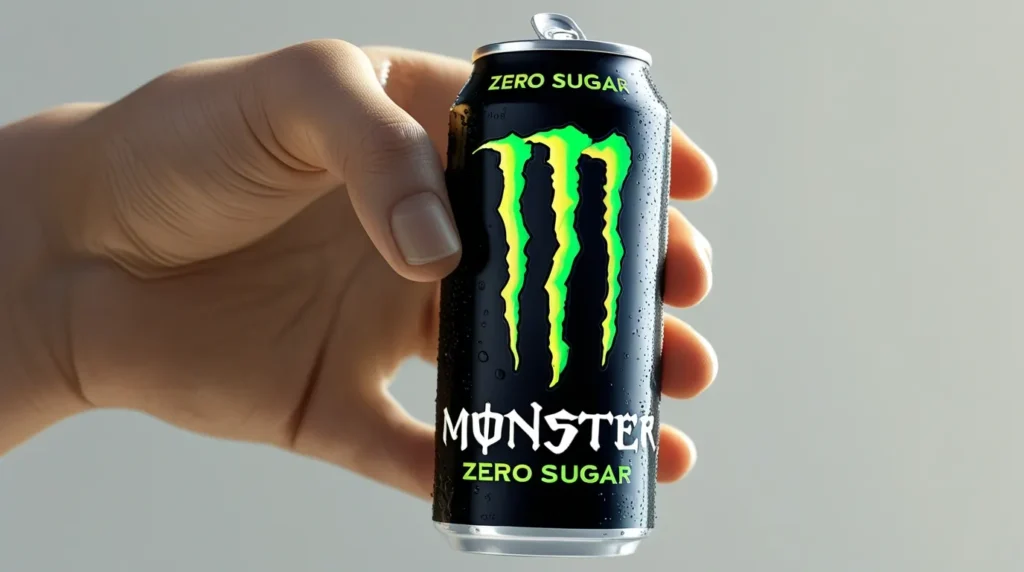
Drinking energy drinks often means exposing yourself to high caffeine doses, added sugars, and a cocktail of stimulants like taurine or guarana. In the short term, you might feel sharper and more awake, but over time, your body adapts. Your tolerance rises, meaning you need more just to feel the same effect. That increases the risk of caffeine dependency, withdrawal headaches, and crashes. The CDC warns that energy drinks can lead to dehydration, heart complications, anxiety, and insomnia—especially when used by teens or in hot environments. CDC
Even one can a month has been tied to disturbed sleep patterns in recent studies. The Guardian In other words: occasional use may not seem harmful, but repeated exposure pushes those risks upward.
Why Are Energy Drinks Bad for You?
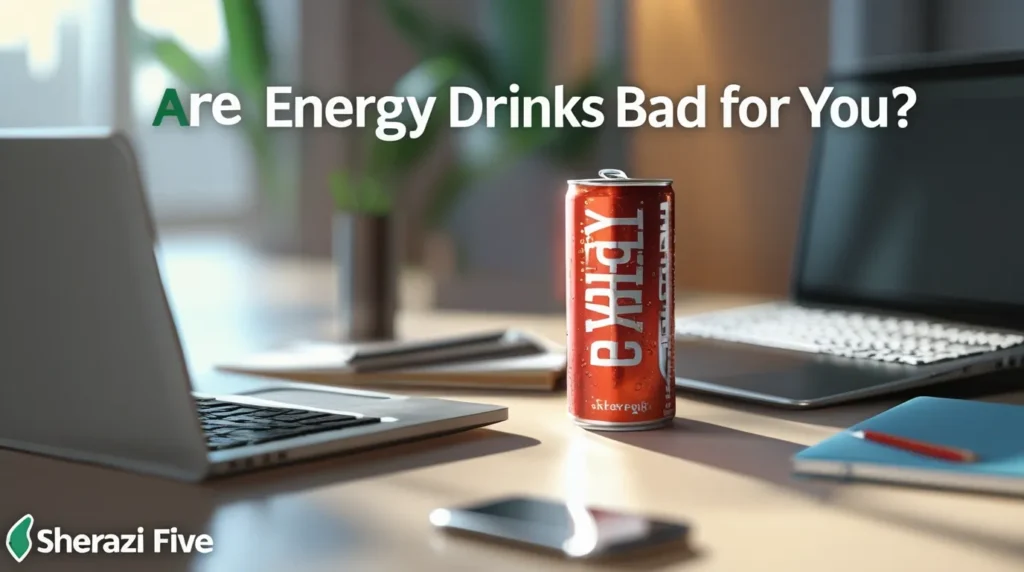
At the heart of the concern are their ingredients. These drinks often combine caffeine, simple sugars, artificial sweeteners, amino acids, and herbal stimulants. Together they act as a potent mix that taxes multiple organ systems. Researchers have linked them to cardiovascular stress, oxidative damage, metabolic imbalance, and behavioral effects. Frontiers+2PMC+2
Caffeine, especially in high doses, can cause rapid heartbeat, hypertension, jitteriness, and insomnia. Wikipedia+2Mayo Clinic Health System+2 The sugar (if present) leads to glucose spikes and crashes, which may exacerbate insulin resistance over time. Sweeteners and stimulants like taurine might also have uncharted risks at high consumption levels. PMC+1
Marketing often hides these risks by positioning energy drinks as “performance enhancers” or “wellness beverages,” which may mislead people into thinking they’re harmless. STAT
Are Sugar-Free Energy Drinks Any Healthier?
It’s tempting to think sugar-free energy drinks are safer—but that’s misleading. When you strip out sugar, producers often add artificial sweeteners (e.g. aspartame, sucralose, erythritol). These may not spike your blood sugar, but they have possible side effects of their own: gut microbiome changes, increased sweet cravings, or vascular stress. One study flagged erythritol (often in sugar-free sodas) as damaging to brain blood vessels at realistic doses. The Sun
Moreover, even without sugar, high caffeine levels remain. Some “zero” energy drinks contain just as much or even more stimulant than sugary ones. That means your heart, kidneys, liver still feel the burden.
Monster Zero Sugar: How Bad Is It for You?
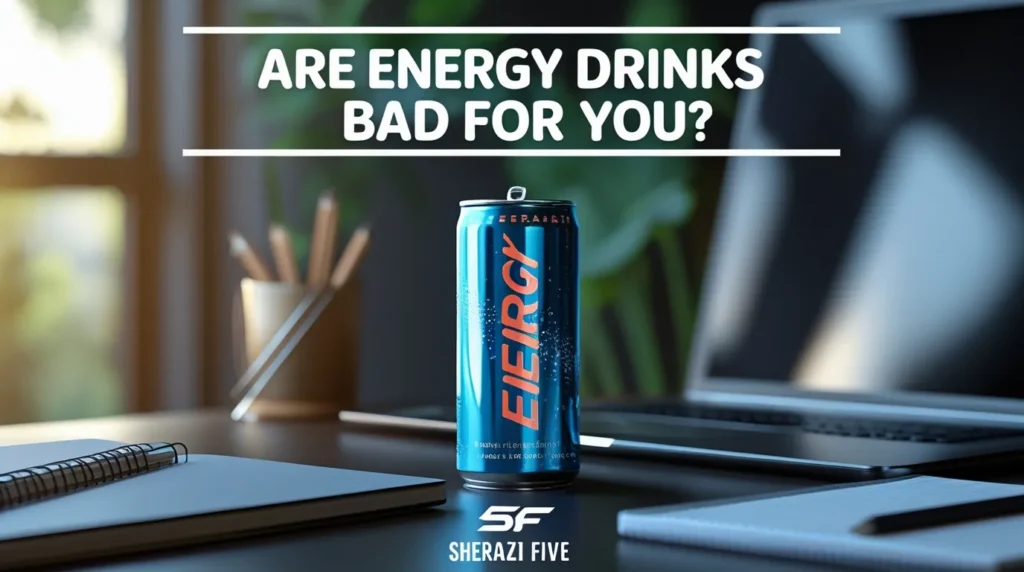
Monster Zero Sugar (also known as Monster Ultra in some markets) is often marketed as a lighter, safer alternative. But is it?
It still contains caffeine—often in the 140–200 mg range per can (varies by region).
It uses artificial sweeteners like sucralose or acesulfame potassium.
It includes taurine, B-vitamins, herbal extracts, which may amplify stimulant effects.
While Monster claims its ingredients are within safe limits, reports exist of heart arrhythmias and adverse events in people with underlying conditions after consuming multiple cans. Wikipedia+2PMC+2
So, how bad Monster Zero Sugar is depends on your health baseline, consumption volume, and whether you’re sensitive to stimulants. It’s certainly not risk-free.
Top 10 Negative Effects of Energy Drinks on the Body
Here’s a breakdown of the most commonly documented harms of energy drinks (both sugar and sugar-free versions included):
Increased heart rate and blood pressure — caffeine and stimulants drive cardiovascular stress. PMC+2sutterhealth.org+2
Arrhythmias & cardiac events — potentially triggering arrhythmias, especially in vulnerable individuals. PMC+2STAT+2
Insomnia & sleep disturbances — even infrequent use can disturb sleep cycle. The Guardian+2Mayo Clinic Health System+2
Anxiety, nervousness, jitteriness — overstimulation of the nervous system. Mayo Clinic Health System+3CDC+3PMC+3
Dehydration & electrolyte imbalance — caffeine is a diuretic and may worsen fluid loss. CDC+2sutterhealth.org+2
Sugar crash / hypoglycemia — for sugary versions: sudden drop in blood sugar after spike.
Oxidative stress & inflammation — evidence shows free radical formation in tissues. PMC+2Mayo Clinic MC Press+2
Kidney stress / damage — prolonged use may strain kidney filtration. Mayo Clinic MC Press+1
Liver strain & toxicity — especially when combined with alcohol or in high doses. PMC+2Mayo Clinic MC Press+2
Neurological / cognitive issues — crashes in focus, potential long-term neuroinflammation. PMC+2PMC+2
These effects may vary by age, health status, dosage, and frequency.
Why Are Energy Drinks Bad for Your Heart?
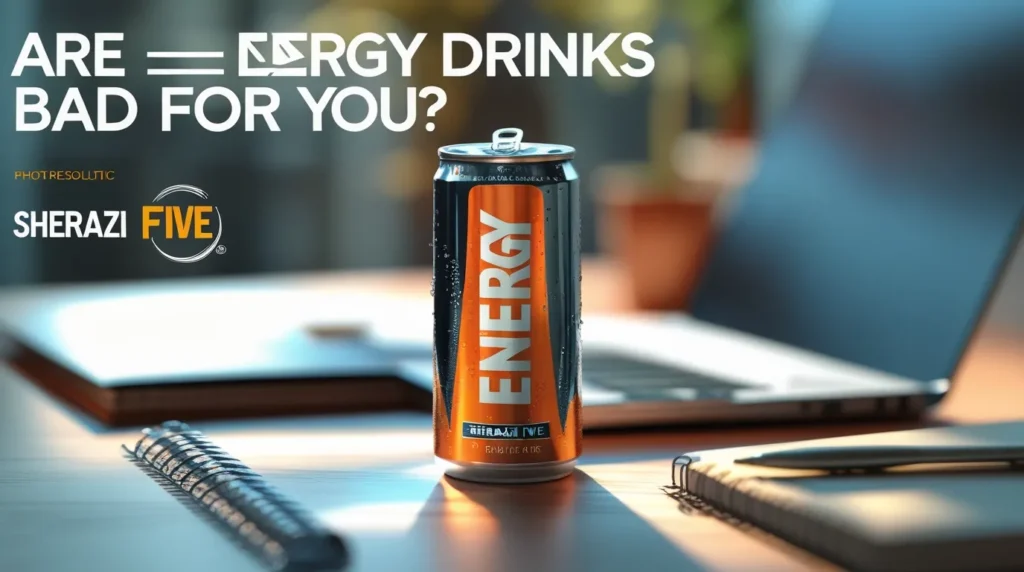
Your heart is one of the first organs to feel the impact of energy drinks. The combination of caffeine, taurine, synephrine, and other stimulants can strain your cardiovascular system. Studies reveal shortened QT intervals, ventricular arrhythmias, and other dangerous electrophysiological changes in lab settings. PMC+1
In real-world terms, consuming energy drinks has been tied to increased incidents of sudden cardiac arrest, especially in individuals with undiagnosed heart disease. STAT+1 One Mayo Clinic Q&A notes that long-term exposure may raise stroke risk as well. Mayo Clinic News Network
Even in healthy individuals, repeated surges in blood pressure and heart rate can accelerate arterial wear, promote endothelial dysfunction, and potentially pave the way for heart disease later.
The Impact of Energy Drinks on Your Brain Function
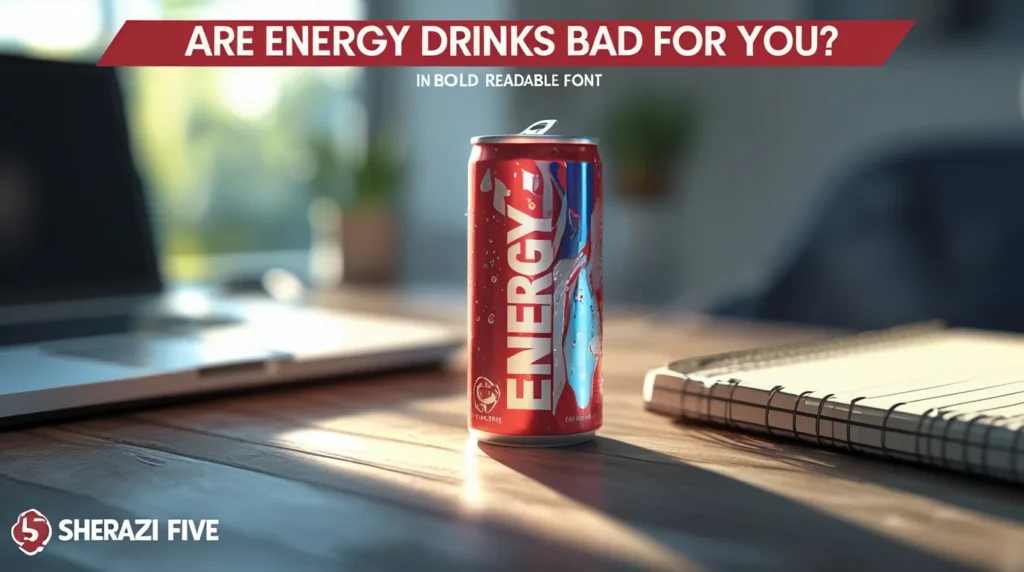
Your brain responds quickly to stimulants in energy drinks. At first, you may feel more alert, react faster, or think sharper—benefits driven largely by caffeine. PMC+2Frontiers+2
But overuse leads to swings. After the stimulant effect wears off, many users experience a “crash”: fatigue, brain fog, irritability. Mixing high stimulants like taurine and caffeine can provoke oxidative damage, neuroinflammation, or changes in neurotransmitter balance (e.g. dopamine, GABA systems). PMC
For younger brains (adolescents), the risks may be higher: repeated overstimulation during development could alter impulse control or reward circuits. Frontiers
How Energy Drinks Affect Your Kidneys and Liver
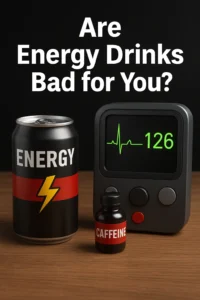
Your kidneys and liver help your body filter toxins and metabolize substances. Energy drinks put them under stress:
Kidneys: Caffeine is a mild diuretic. That raises urine output, which can cause dehydration. Over time, repeated dehydration and high waste load can promote kidney stones, glomerular stress, or declines in filtration function. Mayo Clinic MC Press+1
Liver: Though the liver handles many compounds well, oxidative stress and metabolic overload from energy drink ingredients (especially when mixed with alcohol) may cause hepatocellular damage or elevation in liver enzymes. PMC+1
Animal studies show lipid infiltration, vacuolation of hepatocytes, and inflammatory changes when high doses of energy drinks are given over time. PMC
One study also warned that diet sodas and zero-sugar drinks may carry liver risks via metabolic disruption, though that’s a separate but relevant insight. New York Post
Energy Drinks vs Coffee: What’s the Real Difference?
At face value, energy drinks and coffee both deliver caffeine. But the similarities mostly end there.
| Feature | Coffee | Energy Drinks |
|---|---|---|
| Caffeine only | Yes | Often mixed with taurine, guarana, herbal boosters |
| Sugar content | Usually 0– few grams (unless flavored) | Often high (unless sugar-free) |
| Absorption & spike | Slower, steadier | Rapid spike (liquid + sugar) |
| Antioxidants | Coffee has polyphenols and other beneficial compounds | Minimal beneficial antioxidants |
| Additive risk | Lower | More ingredients with unknown interactions |
| Typical servings | 80–150 mg per cup (varies) | 100–300+ mg per can or serving |
Because energy drinks combine multiple stimulants, the synergistic effects can be more dangerous even if caffeine alone is within accepted limits. Wikipedia+2PMC+2
That’s why many experts argue: coffee is safer in moderation, while energy drinks carry higher risk margins.
Can Energy Drinks Be Safe Once in a While?
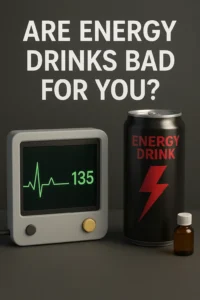
Yes—but in a limited, cautious way. For a generally healthy adult, an occasional energy drink may not cause harm. But “once in a while” does not mean “regularly.” The effects depend on:
Your baseline health (especially heart, liver, kidney)
Dose & volume consumed
Whether you’re combining it with alcohol, sports, or other stimulants
How often you repeat the behavior
Limit intake to one moderate can, never drinking too late (to protect sleep), and avoid use during dehydration or intense exercise. Don’t let it become a crutch.
However, for people with hypertension, heart conditions, anxiety, kidney or liver disease, or those taking stimulant medications, even rare use could be risky. The American Academy of Pediatrics says energy drinks should be avoided entirely by adolescents and children. CDC+1
Do Energy Drinks Cause Long-Term Health Problems?
Over time, chronic energy drink use may contribute to:
Cardiovascular disease via repeated hypertension and arterial injury
Type 2 diabetes or metabolic syndrome, especially with sugary versions
Chronic kidney disease, especially in vulnerable individuals
Liver dysfunction or non-alcoholic fatty liver disease
Sleep disorders, insomnia, and downstream mental health issues
Addiction-like behaviors, craving cycles, and reliance
While long-term human cohort studies are still limited, evidence from observational data and animal models supports these risks. PMC+2Frontiers+2
Healthy Alternatives to Energy Drinks for Boosting Energy
You don’t need dangerous drinks to feel energized. Try these safer strategies and natural options:
Green tea / matcha — milder caffeine plus antioxidants
Yerba mate — smooth, sustained lift
Water + electrolytes — dehydration often masquerades as fatigue
Whole-food snacks (oats, fruit, nuts) — slow-release energy
Cold showers / movement breaks — natural stimulant
B-complex vitamins, adaptogens (in moderation)
Quality sleep & stress management — the foundation
These options avoid the crash, addiction risk, and organ stress of energy drinks.
🔍 Summary & Final Thoughts
So, are energy drinks bad for you? Yes — especially when consumed frequently or without caution. While occasional use may be tolerable for healthy adults, the risks to your heart, brain, kidneys, liver, and overall physiology are real and documented. Even sugar-free versions carry dangers, due to artificial sweeteners and high stimulant loads. Monster Zero Sugar isn’t an exception.
High-Protein Snacks for Weight Loss: Healthy and Delicious Choices
FAQs
1. How unhealthy are energy drinks really?
Energy drinks can strain your heart, liver, kidneys, and brain, especially with frequent use. Occasional use may be tolerable, but regular intake carries real health risks.
2. Is it okay to drink energy drinks everyday?
No, daily consumption can lead to heart problems, sleep disturbances, caffeine dependency, and metabolic issues.
3. What’s the safest energy drink?
No energy drink is completely safe; lower-caffeine, sugar-free options may reduce risk but still carry stimulant-related effects.
4. Is 3 energy drinks a week bad?
Occasional use like three per week is less risky than daily use, but it can still affect sleep, heart rate, and anxiety levels.
5. What is in a white Monster?
White Monster (Ultra series) typically contains caffeine, taurine, B-vitamins, artificial sweeteners, and herbal extracts.
6. Is one Red Bull a day bad for you?
For most healthy adults, one can is usually safe, but it can still affect sleep, blood pressure, and cause jitteriness.
7. What are 10 negative effects of energy drinks?
Increased heart rate, arrhythmias, insomnia, anxiety, dehydration, sugar crashes, oxidative stress, kidney strain, liver strain, cognitive crashes.
8. Is one Monster a day okay?
For healthy adults, one can occasionally may be tolerated, but daily consumption increases cardiovascular and metabolic risks.
9. Is coffee healthier than energy drinks?
Yes, coffee usually has fewer additives, lower caffeine spikes, and beneficial antioxidants, making it safer in moderation.
10. Should I quit energy drinks?
If you experience heart issues, sleep problems, anxiety, or overuse them, quitting or reducing intake is strongly recommended.
11. What’s the healthiest thing to drink for energy?
Water, green tea, matcha, or smoothies with whole foods offer natural, sustained energy without harmful stimulants.
12. Which is the no. 1 energy drink?
Global popularity often places Red Bull at #1, though “best” depends on taste, caffeine tolerance, and health considerations.
13. Are energy drinks addictive?
Yes, high caffeine and sugar content can lead to dependence, cravings, and withdrawal headaches.
14. What B12 is in Monster?
Monster contains methylcobalamin or cyanocobalamin forms of Vitamin B12 for energy metabolism support.
15. Are zero sugar energy drinks bad for you?
Yes, artificial sweeteners don’t spike blood sugar but may affect gut health and still include high caffeine levels.
16. How do energy drinks affect your brain?
They temporarily boost alertness but can cause crashes, oxidative stress, neuroinflammation, and neurotransmitter imbalances over time.
17. How many cups of coffee are equivalent to a Monster?
One Monster (140–200 mg caffeine) is roughly equivalent to 1.5–2 standard cups of coffee.
18. Is coffee or Red Bull worse for your teeth?
Red Bull is worse due to high acidity and sugar content, which increase enamel erosion risk.
19. What can too much B12 cause?
Excess B12 is generally safe but may cause mild acne, insomnia, or digestive upset in sensitive individuals.
20. How much taurine is in Monster?
One can contains about 1000 mg (1 g) of taurine.
21. Is caffeine a drug?
Yes, caffeine is a stimulant drug that affects the central nervous system and can be addictive.
22. What’s the healthiest energy drink?
Natural options with moderate caffeine, no sugar, and added antioxidants (like green tea or yerba mate) are healthiest.
23. How do energy drinks impact teeth?
They erode enamel, promote cavities, and increase tooth sensitivity due to acidity and sugar content.
24. Do energy drinks deplete dopamine?
Repeated overstimulation may alter dopamine pathways temporarily, potentially contributing to dependency and mood swings.
25. Is taurine linked to leukemia?
Current research does not show taurine as a cause of leukemia; it is generally considered safe in moderate amounts.
26. How long does Monster Energy stay in your system?
Caffeine half-life is 4–6 hours; most effects wear off in 6–10 hours, but full clearance may take longer depending on metabolism.
27. What are the side effects of too much taurine?
High doses may cause low blood pressure, nausea, headaches, or gastrointestinal upset, though moderate levels are safe.
28. What is the most unhealthiest energy drink?
Those with very high sugar and caffeine combined with multiple stimulants pose the greatest risk; exact brands vary.
29. What’s healthier, Red Bull or Monster?
Red Bull is slightly lower in sugar and caffeine per serving, but both carry similar stimulant-related risks.
30. What is the best alternative to energy drinks?
Green tea, matcha, yerba mate, hydration, nutritious snacks, exercise, and quality sleep are safer alternatives.
31. Is taurine sperm?
No, taurine is an amino acid, not sperm.
32. Who should avoid taurine?
People with kidney disease or heart problems should limit taurine, especially in high doses via energy drinks.
33. What does taurine do for hair?
Taurine may support hair follicle health and prevent oxidative stress but is not a guaranteed hair growth solution.
34. What is truly the healthiest energy drink?
Moderate caffeine natural drinks like green tea or yerba mate with no sugar and antioxidants.
35. Why are energy drinks banned in some countries?
High caffeine, stimulant combinations, and health risks for youth have led to restrictions in certain regions.
36. What is the best time to drink an energy drink?
Early morning or before exercise, avoiding late afternoon/evening to prevent sleep disruption.





Pingback: Miracle Garden Dubai 2025 – Miracle Garden Timings,Ticket ,
Nieuwste adult websites brengen innovatieve inhoud voor volwassen entertainment.
Ontdek veilige nieuwe platforms voor een moderne ervaring.
Here is my site :: best free porn videos
Hi there to all, how is the whole thing, I think every one is
getting more from this website, and your views are pleasant in favor
of new viewers.
Темы для взрослых широко доступен на специализированных платформах
для зрелой аудитории. Выбирайте гарантированные источники для обеспечения безопасности.
My homepage; BUY XANAX WITHOUT PRESCRITION
whoah this weblog is fantastic i really like reading your posts.
Stay up the great work! You know, a lot of persons are looking round
for this info, you can aid them greatly.
New porn sites bring innovative content for adult entertainment.
Explore reliable fresh sites for a modern experience.
My site – BUY TADALAFIL ONLINE
Adult video’s kijken op veilige en betrouwbare
platforms. Vind veilige streaming hubs voor een premium ervaring.
Also visit my webpage: ANAL FISTING PORN MOVIES
Watch adult videos securely on reputable
adult platforms. Find safe streaming hubs VIAGRA FOR YOU
a premium experience.
色情内容 可在各种成人娱乐网站上获取,供娱乐用途。始终选择 可靠的成人网站 以确保安全体验。
My blog post: buy xanax without prescrition